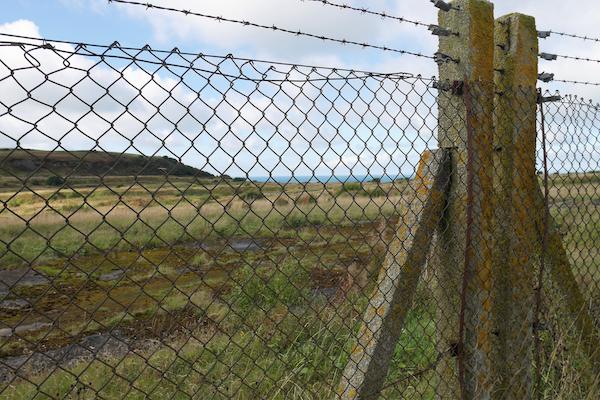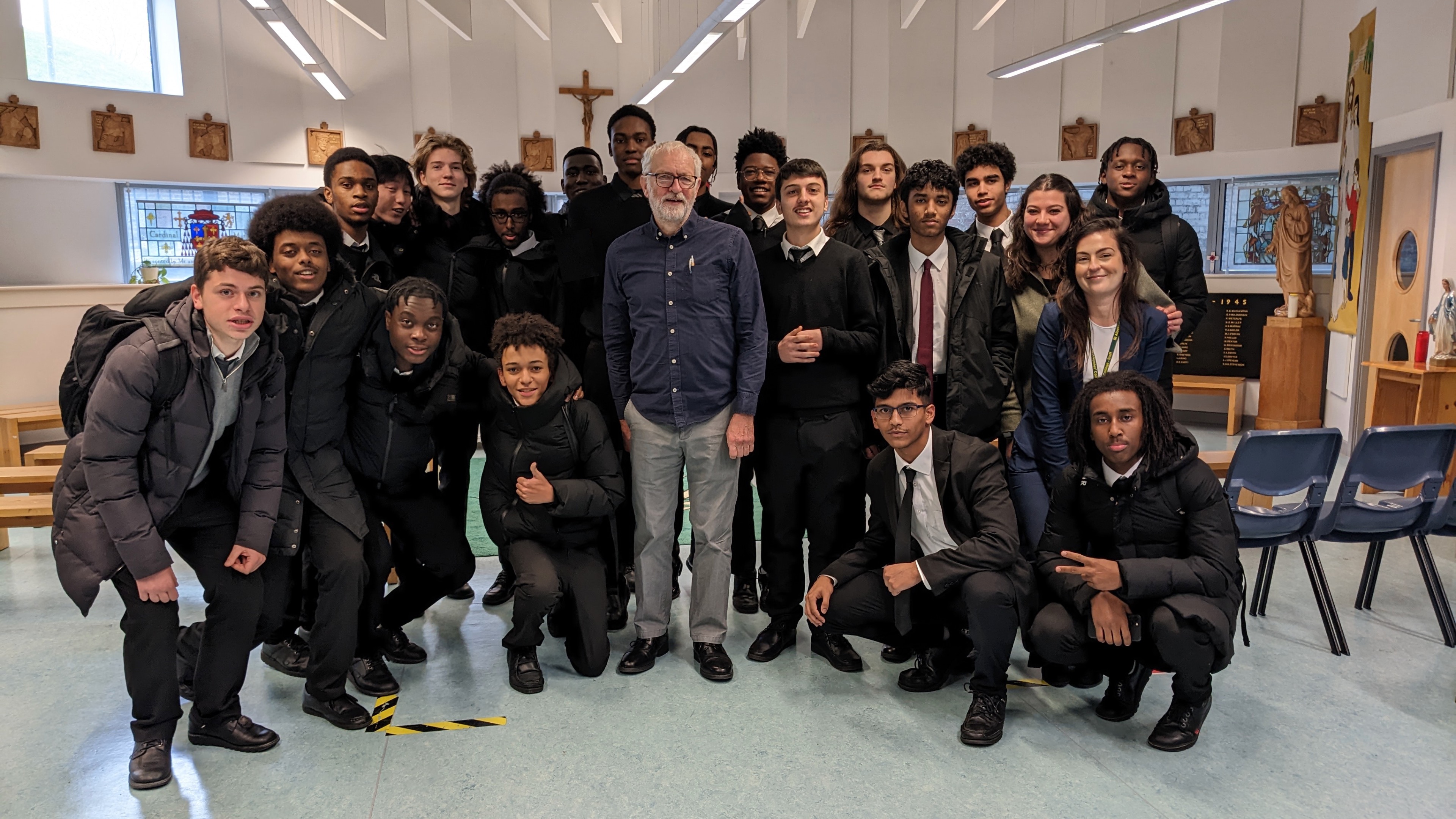Former Labour Party leader Jeremy Corbyn MP has visited St Aloysius’ College in Islington, where he spoke of the financial crisis faced by many and encouraged the students to continue supporting their families and wider community. St Aloysius’ College is currently running a food drive to raise supplies for those in need and donations dropped at reception will be distributed to local charities. Corbyn took questions from students and staff on a range of subjects including asking for his take on the government’s approach to mental health and the cost of living crisis. He said: “It’s clear that the constant and concerted effort of school staff has had an enormous impact on the success of the historic school.” Headteacher, Paula Whyte said: “We were 12th in the country (GCSE 2022) for progress for Catholic boys schools nationally. We are relentless in our mission to continually improve the quality of education offered to our boys coupled with outstanding pastoral care and it was wonderful to share our recent successes with him.”
Prime Minister Rishi Sunak must act now to help prevent a huge humanitarian catastrophe in East Africa, three former Secretaries of State for International Development and the heads of the UK’s leading aid agencies have warned in a joint letter. More than 28 million people are facing life threatening food insecurity across East Africa, they warn. In drought-stricken Somalia, Ethiopia and Kenya, it is estimated that one person is dying every 36 seconds from hunger and more than seven million children are acutely malnourished across the three countries. The letter says: “East Africa is facing a catastrophic hunger crisis caused by one of the worst droughts in living memory. It is looking increasingly likely that a fifth consecutive rainy season has failed in the region, leaving millions of families in a desperate situation and facing starvation.” The UK has confirmed an allocation of just £156 million this year for East Africa, less than a fifth (18 per cent) of the £861m provided in 2017-8 during the region’s last major hunger crisis. Christine Allen, director of Cafod, said: “The families I met in Kenya were well used to adapting when things get tough, but this drought has been unprecedented, leaving families who otherwise cope finding themselves in desperate situations. People are doing what they can to support each other, but they need aid urgently.”
An archaeological dig near the town of Helmsley, North Yorkshire, has uncovered a medieval farm linked to the famous Cistercian monastery of Rielvaux. The site, located within the North York Moors National Park, took 16 volunteers the equivalent of 129 days across six weeks to unearth substantial evidence of agriculture and trade at the location. Items excavated to date include rosary beads made of jet, pottery and glazed tiles. The farm is located close to a medieval grange built shortly after Rievaulx Abbey’s foundation in 1132 and managed by the abbey until its dissolution in 1539. Cistercians were known for their economic development of Yorkshire, diverting rivers to aid grazing in the area’s moorland’s as part of England’s historically important wool trade.
The Catholic Union has urged lay Catholics to respond to a government survey on the issue of assisted dying. The House of Commons health and care select committee has issued a call for evidence in relation to its inquiry into assisted dying, open until 20 January 2023. Because the inquiry is likely to influence legislators in forming laws on the topic, the Catholic Union has asked Catholics to submit their views through the union’s submission on the topic. The group is also encouraging those with a particular interest or expertise in the topic to submit evidence directly to the cross-party committee. The news follows the tabling of proposed legislation on assisted dying in the Scottish parliament and the territories of Jersey and the Isle of Man.
A South London Catholic school is to close in response to plummeting enrolment as the religious order in charge shifts focus to East Africa. St Francesca Cabrini Roman Catholic Primary School in Southwark, established and managed by the Missionary Sisters of the Sacred Heart of Jesus since 1902, will close at the end of next year’s summer term. The Missionary Sisters intend to refocus their resources on East African countries like Uganda and Ethiopia. The school has an enrollment of just 86 of 420 possible places, as of September 2022. According to a Southwark Council report, the school, located in Forest Hill Road had 350 students on its books as recently as 2016. According to the council a combination of factors, including the impact of Brexit and welfare reforms, has led to the collapse of enrolment since.
Archbishop William Nolan of Glasgow and Bishop John Arnold of Salford, both episcopal leads on the environment for England, Wales and Scotland, joined more than 150 Church and Christian leaders on Tuesday to send an open letter to the UK government deploring the decision last week to approve a new coal mine in Cumbria. The first new coal mine in the UK for 30 years, they said it contradicts the UK government’s commitment to phase out coal during its COP26 presidency. The government’s advisory Climate Change Committee also criticised the go ahead for the project. Its Chair, Lord Deben, described the proposal as “absolutely indefensible” and said its approval would damage the UK's leadership on climate change. Bishop John Arnold, episcopal liaison for the Catholic bishops of England and Wales, told The Tablet: “Despite a government commitment to phase out coal-mining, in spite of the possibilities of creating jobs in renewable energy production in Cumbria, despite the fact that U.K. steel producers will not use this type of coal, the government is permitting the opening of a new mine. While illogical, it is a blatant contribution to further climate damage at a time when the Prime Minister has recently stated, at COP27, that the U.K. is taking a lead in environmental care.”
A new support centre run by the St Vincent de Paul Society has been opened officially by the Archbishop of Birmingham Bernard Longley and SVP chief executive Elizabeth Palmer in south Birmingham. Based at Manningford Hall, Druids Heath, the centre will support those in need in the area, initially being open for three days a week. From Friday 2 December it opened as a ‘warm place” for the winter, where people can enjoy a cup of tea and a light lunch if they are unable to heat their own house or flat. It will also offer a food bank and in time the aim is to offer a senior citizens lunch, mothers and toddlers groups, advice and support for women in, or escaping, abusive relationships and support for children with special needs and their parents. Members of the local SVP Conference, SS Dunstan and Jude, will also be on call to visit, assess and if possible help those in need.
Around 60 women and seven men gathered at Ushaw College, Durham, at a conference organised by the National Board of Catholic Women entitled “women at the periphery taking centre stage”. The conference called for women to continue to be involved with the Church’s synodal process and to undertake project work across the generations and with vulnerable women to build a church suited to the needs of the future. The board’s chair Margaret Smart said: “The often-unheard voices of the young and of women were emphatically heard in a spirit-filled and lively environment.” Speakers included Sr Marie Kolbe Zamora from the Vatican’s General Secretariat of the Synod of Bishops, and Professors of Theology and Religion, Anna Rowlands and Karen Kilby from Durham University. Abbot Hugh Allan represented the Catholic Bishops’ Conference of England and Wales. Prof Anna Rowlands explained that many are encountering new people and ideas in the Synod process and there is a task now for the Church to draw closer to the ordinary lives of women and to be a powerful ally of women. Lives of women caught up in violence, poverty and environmental problems were highlighted by Dr Pat Jones of Women at the Well, Elizabeth Palmer of SVP, Nikki Dhillon Keane of the Violence Against Women and Girls Committee of NBCW and Christine Allen of Cafod.
The bishops in Ireland are working with the Irish Red Cross and county councils to upgrade parochial houses to accommodate Ukrainian families. Ireland’s housing crisis has compounded the challenges of accommodating over 70,000 Ukrainian refugees since Russia invaded Ukraine last February. A special collection was held at Masses last March which raised €4.5m for refugees and those remaining in Ukraine. In a statement following their winter general meeting, the bishops said they had been working with funders, including The Albert Gubay Charitable Foundation and Benefact Trust, to finance church projects, including accommodation, for Ukrainian refugees. These also include the provision of English language classes, information sessions, respite activities, Ukrainian language resources, and the purchase of basic goods as well as a grant for the Ukrainian Church based in Donnycarney parish in Dublin.
The Irish bishops have expressed concern over the political uncertainty in Northern Ireland. The lack of devolved government and a functioning elected Assembly in Stormont, they warned, is adding to the many challenges currently faced by families, including soaring prices for essential items and financial pressures for those on low incomes with few savings. “We call on all elected representatives to keep their focus on serving the Common Good: a shared and peaceful future can only be built on the foundations of a shared and compassionate present,” they said. The bishops also highlighted that 2023 marks the 50th anniversary of the Ballymascanlon talks that saw the Catholic Church develop strong ecumenical relations which have continued to grow over the past five decades. An ecumenical joint service of thanksgiving will be held in St Anne’s Cathedral, Belfast, on 22 January with Archbishop Eamon Martin and the Methodist Church’s Rev’d Harold Good. The Irish Inter-Church Meeting, which brings together Church leaders, meets four times a year. The recent conference was entitled: “Creatively reconfiguring our post-pandemic understanding of church”.



 Loading ...
Loading ...